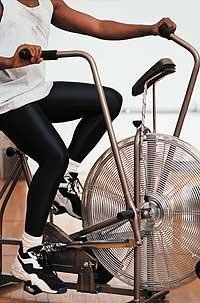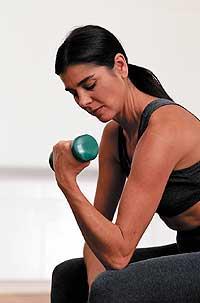Jeans

To be more and more muscular and keep it, use different means. In the gym he spends many hours daily until becoming his second home. Practice sports obsessively and compulsively. Unfortunately, in this case the goal of the sport is not to be healthier, but to have more and more muscle. If one day you run out of going to the gym you suffer anxiety as you think this will cause you a loss of muscle volume.
In terms of diet, those who suffer from veorexia considerably increase the amount of protein in the diet and decrease fats. Eat plenty of cooked egg whites — you can eat up to 20 egg whites a day — meats and fish with less fat, prepared with as little fat as possible, and skimmed dairy (milk, yogurts, fresh cheese...). The goal is to get an increasingly muscular and strong body.
In addition to an unbalanced diet, take steroids and anabolic agents to increase muscle mass production, with very harmful consequences: they increase the risk of cardiovascular disease, cause liver disorders, reduce the size of the testes, generate erection problems and increase the risk of prostate cancer.
Despite all these measures and the fact that people have too many muscles in their eyes, those who have vesicles do not notice and never look quite muscular. It is clear, therefore, as in other eating disorders, that anorexia and bulimia, for example, are problems related to body image. One of the agents is the pattern of the bodily images that society imposes in one way or another.
This disease is more common among men than among women and has spread especially among those who practice bodybuilding, which does not mean that all those who practice this sport are sick. According to studies, 10% of people who regularly go to the gym suffer from denim problems. In Spain there are approximately 700,000 cases.

The psychological characteristics of the person with blanorexia are very similar to those of other eating disorders: low self-esteem, closed character, lack of maturity, problems of social integration, anxiety, depression... In addition, it turns life into a ritual: it organizes what to eat and what exercise to do throughout the day, it weighs very often, constantly looks in the mirror to check how many muscles it has gained or lost...
Bigorexia, in addition to its psychological consequences, has numerous physical and aesthetic consequences: the consequences of the aforementioned anabolic agents, the disproportion between body and head; bone and joint problems due to excess weight; the lack of lightness, the muscles and tendons shorter...
In addition, when the diet is unbalanced, the liver and kidney have to do an enormous job in order to eliminate the remains of proteins, and they have problems and damage in both organs.
The most important treatment is psychological. It is necessary to increase the self-esteem of that person and teach to accept and love his body as it is. On the other hand, and along with psychological treatment, food education is very necessary to know what the balanced diet is and lay the basis for doing so.
Orthorexia
Orthorexia is another food-related psychological disease: pathological obsession with healthy foods. American physician Steve Bratman first used the word orthorexia in 1996 to diagnose the confusion he suffered.
Wanting to eat healthy is fair and very appropriate. But when this idea becomes obsession, it can be as harmful as any abuse or restriction.
The person who suffers this confusion eats, eats, but controls the diet in a very strict way and refuses the pleasure of eating. Analyzes the amount of kilocalories and food, as well as the quality and preparation of food. It usually rejects meats, fats, certain dairy, packaged foods, sugar, flour, precooked, soft drinks, caffeine, and any artificial substance. In their diet predominate biological foods, dietary products, whole and without fat, and is eaten mostly raw or cooked. He must know the origin of food and not contain any additives, but rejects it.

Orthorexia cannot eat those who do not control, so it is not able to participate in the commitments or celebrations that generate normal social life. Therefore, it considerably reduces social and family life. He is a very demanding person, obsessive and very narrow and hard on himself.
This food radicalism can also lead to serious health problems. On many occasions, in this control and rigor, the needs of minimum calories and vitamins are not met. Most are very thin and present with anemia, malnutrition or osteoporosis, depression, certain psychological diseases and social isolation.
Being a very new mixture, the treatment is not fully defined. But, as in other eating disorders, the main therapy is psychological and, at the same time, nutritional education. According to the World Health Organization, healthy eating is one that guarantees the physical, psychological and social health of a person. If one of these factors is affected by eating, then eating is not healthy.
So remember that, as in all areas, balance is very important in nutrition, social and psychological. It is important to eat every day as healthy as possible and give importance to food, but do not forget that from time to time it is convenient to make a plan to set aside that custom and go to the cider shop or any other restaurant.
Buletina
Bidali zure helbide elektronikoa eta jaso asteroko buletina zure sarrera-ontzian











